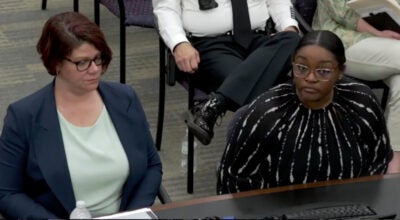McCrory backs NC schools spending, unveils grants
Published 12:00 am Friday, August 2, 2013
CHAPEL HILL (AP) — Gov. Pat McCrory defended the state’s budget Thursday from criticism that it shortchanges education and he proposed a plan where teachers and schools would compete for $30 million in extra money over the next two years.
McCrory’s proposal is an Education Innovation Fund that would distribute grants to schools showing changes that improve student instruction, similar to the idea behind the Obama Administration’s Race to the Top fund.
North Carolina was awarded a $400 million Race to the Top grant in 2010 to improve teacher quality, student performance and career preparation. The state got another $70 million in 2011 to improve early childhood education.
McCrory would redirect about $26 million of the Race to the Top money into his proposal, if the U.S. Education Department agrees to it, said the governor’s education advisor, Eric Guckian. Another $4 million in state money was set aside in the state budget McCrory signed into law last week.
Of the $30 million, about $10 million would go toward giving 1,000 “master teachers” $10,000 each. They will act as role models and show other teachers and administrators what works and what doesn’t. The stipends would begin a shift away from what McCrory called the state’s “archaic” teacher pay scale based on experience.
“Teachers are not a class but professionals who should be rewarded based upon their individual value to students and to their school,” McCrory said.
McCrory emphasized North Carolina’s new budget will spend more on kindergarten through 12th grade than last year. Public school spending is $23 million higher than a year ago, for a total of $7.9 billion, McCrory said.
But the legislation specifies public schools will get $117 million less than what they would have if lawmakers changed nothing and accounted for increased enrollment and inflation. The University of North Carolina system will get $126.5 million less than what was projected as needed to maintain last year’s levels. Community colleges will get $16 million less.
“It still isn’t enough, but money isn’t the only answer,” McCrory said. “We have to look for ways to spend our money more efficiently, more effectively. And then we need to look for ways to increase our revenue stream so we can put even more money toward education.”
The governor also defended the budget against criticism that it fails to raise teacher salaries, which are among the lowest in the country. McCrory said the state needed to spend about $500 million more on Medicaid — which pays the health care costs of 1.5 million poor children, older adults and the disabled. If it weren’t for that, teachers might have gotten a 3 percent pay raise this summer, the governor said.
However, a package of tax cuts McCrory signed after passage by the GOP-led General Assembly could have the effect of a 1 percent raise for teachers earning $40,000 to $45,000 a year, McCrory said. Generally, teachers with bachelor’s degrees reach $40,000 salaries after 15 years of experience. Teachers who earned master’s degrees could reach $40,000 after 10 years, but the new state budget eliminates that pay boost.
The tax cut package will reduce the state’s revenues by $524 million in the next two years.
About 100 demonstrators picketed outside the hotel where McCrory spoke to protest changes in the budget, including an end to job security provisions for veteran teachers and shifting $20 million to help low-income children attend private or religious schools.
Guckian contradicted a McCrory criticism that the state’s education is “a broken system.”
“I don’t think it’s broken at all. I think we need to improve things. I think we need reforms,” he said. “North Carolina has been an education leader and it’s going to continue to be.”
More News



